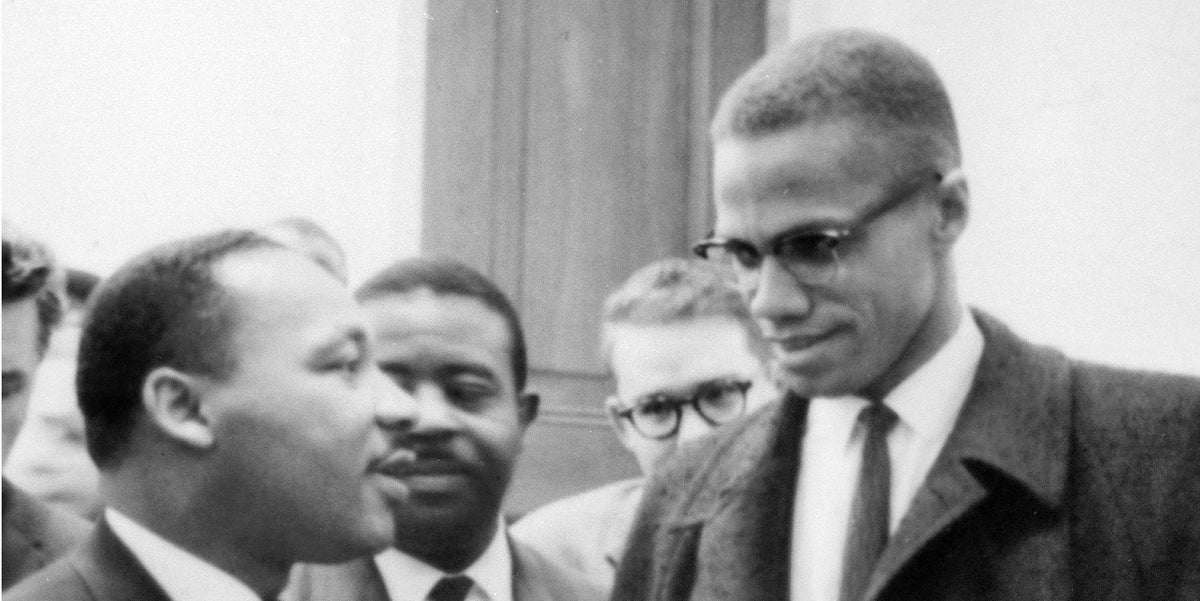
A famous, oft-repeated quote from Martin Luther King Jr about fellow activist Malcom X, in which the latter is denounced for his “fiery, demagogic oratory,” is a fake, according to the author of a forthcoming King biography.
For years, students of history were taught that King had denounced Malcom X in a 1965 interview with Playboy, a quote which fed into a historical narrative of the two men as polar opposites when their relationship and views were far more nuanced. The magazine piece is King’s longest print interview, and has served as an important reference for his overall views.
Jonathan Eig, author of the forthcoming King: A Life, discovered the discrepancy while looking through the archives at Duke University.
The version of the quote, captured by journalist Alex Haley during the interview, that is remembered by the public reads as follows:
“And in his litany of articulating the despair of the Negro without offering any positive, creative alternative, I feel that Malcolm has done himself and our people a great disservice. Fiery, demagogic oratory in the black ghettos, urging Negroes to arm themselves and prepare to engage in violence, as he has done, can reap nothing but grief.”
The real quote, according to one of Haley’s typed transcripts, is considerably more mild.
“I have met Malcolm X, but circumstances didn’t enable me to talk with him for more than a minute. I totally disagree with many of his political and philosophical views, as I understand them. He is very articulate, as you say. I don’t want to seem to sound as if I feel so self-righteous, or absolutist, that I think I have the only truth, the only way. Maybe he does have some of the answer. But I know that I have so often felt that I wished that he would talk less of violence, because I don’t think that violence can solve our problem. And in his litany of expressing the despair of the Negro, without offering a positive, creative approach, I think that he falls into a rut sometimes.”
Mr Eig told The Washington Post that the modifications, some of which appear totally fabricated, amount to “journalistic malpractice” which takes away from the fact that “King was much more open-minded about Malcolm than we’ve tended to portray him.”
“I think its historic reverberations are huge,” he told the paper. “We’ve been teaching people for decades, for generations, that King had this harsh criticism of Malcolm X, and it’s just not true.”
Haley, who died in 1992, has been accused of other issues with his work.
In 1978, Haley settled a plagiarism lawsuit for $500,000 relating to his best-selling book Roots. Haley denied he ever plagiarised a 1967 novel called The African to write his book, which was later adapted into a popular TV show, but said he regretted portions of the novel “found their way” into his work.
The altered understanding of the quote is one of a number of controversies surrounding the historiography of King.
The civil rights activist was considerably more radical than most Americans realise, offering sharp critiques of US capitalism, militarism, poverty, and white moderates, in addition to his more famed remarks like the “I Have a Dream,” speech.
Invoking MLK’s legacy is so commonplace, especially in Washington, it sometimes leads to moments of extreme irony, such as a 2019 controversy over the FBI honouring King, after the bureau spent years surveilling and harassing the civil rights icon.







